Paper Doll
Ask Paper Doll: How And Where Can I Donate Lots of Books?

This is the first in a recurring series of Ask Paper Doll posts where you can get your burning organizing questions answered by Paper Doll, a 20-year veteran professional organizer and amateur goofball.
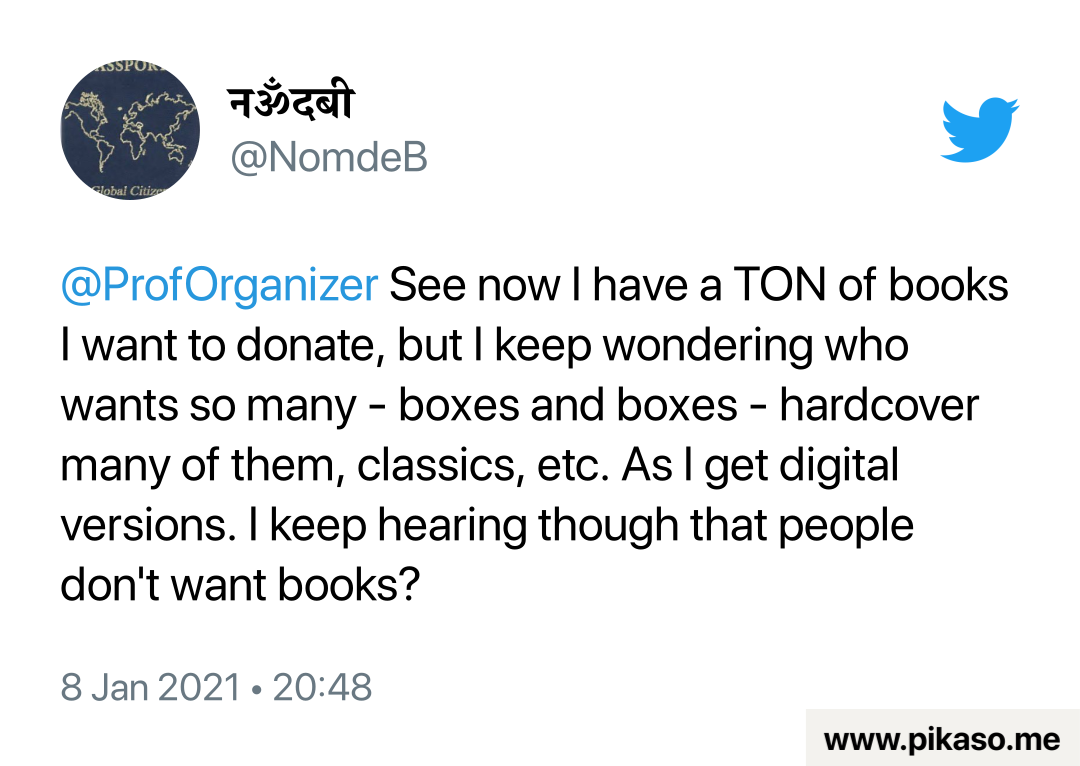
Dear @NomdeB,
These are actually three (excellent) questions! The first, implied, is the bulk of what will address today: where and how can we donate a largesse of books? The second, “Who wants so many?” is partly answered along with the first, but the truth is that if you have a huge book collection (and it appears that you do), you’ll probably be making donations to multiple venues.
But the question at the end of your tweet deserves a bit of attention.
PRINT BOOKS VS. DIGITAL
Do people still want real, tangible books?
And, at the risk of sounding like I’m saying, “Yes, Virginia, there is a Santa Claus,” yes, @nomdeB, people do still want, and read, real books. At the very least, in the United States, even in an era where all-things-digital are the rage, physical books still outsell ebooks. Statistics from 2020 have not fully been reviewed, but in the prior year, the U.S. book industry had $26 billion in revenue; $22.6 billion of that was for print books and only $2.04 billion in digital books. (The rest, one imagines, are in audio books, braille, and rarer, specialized formats.)
[Editor’s note: After publication of this post, results were released showing that print book sales rose 8.2% in 2020, the largest annual increase since 2010!]
It seems the death of the printed book has been greatly exaggerated. There’s some academic research as to why many people (like myself) still prefer tangible books. For example, one study found that print books had the edge over print when it comes to greater reading comprehension and lesser eye fatigue. Further anecdotal evidence indicates that people appreciate the tactile sensation of progress as you get further along in a print book. And I’d be remiss if I didn’t share findings from my alma mater, Cornell University, which has found that “both users and non-users of e-books generally preferred using printed versions of textbooks.” (I hope it’s not just because you can satisfying slam a textbook when you can’t understand what you’re reading!)
People like to read, and people who like to read have a fondness for books they can hold in their hands, show off on the subway, bookmark and annotate easily, and display in their homes to impress their beaus or in their offices to impress their bosses. A book is not just the content of what is written inside, but what it allows one to feel upon seeing the cover, and what we hope it says about ourselves. Books, like people, are complicated.
With that concern dispensed of, let’s move on to what to do when you’re simply ready to let go of the excess – the books you’ve already read and won’t read again, the books you’ve outgrown, and the books you never read, either because they were ill-fitting gifts or you acquired them for aspirational rather than practical purposes and you’re finally, finally giving up trying to read them. (Hello, Moby Dick?)
YOUR BOOKS
@nomdeB, you’re not kidding about having a ton of books.
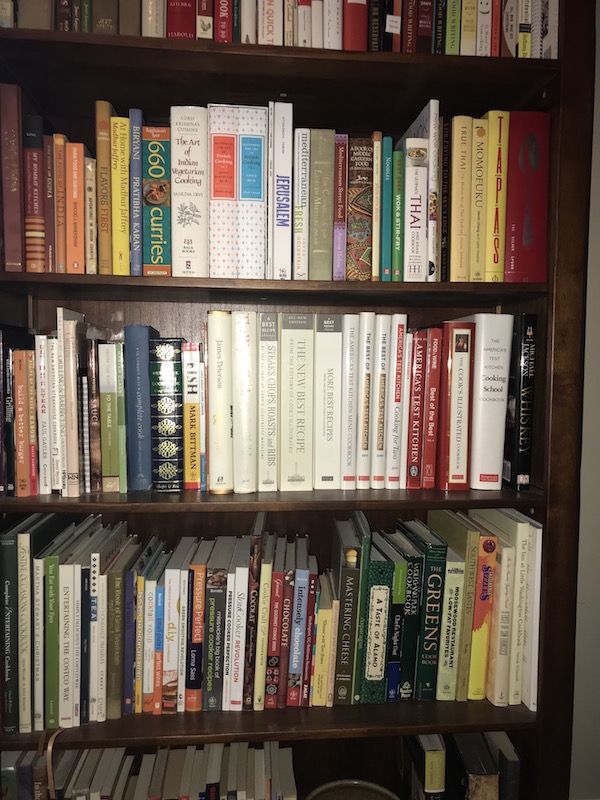
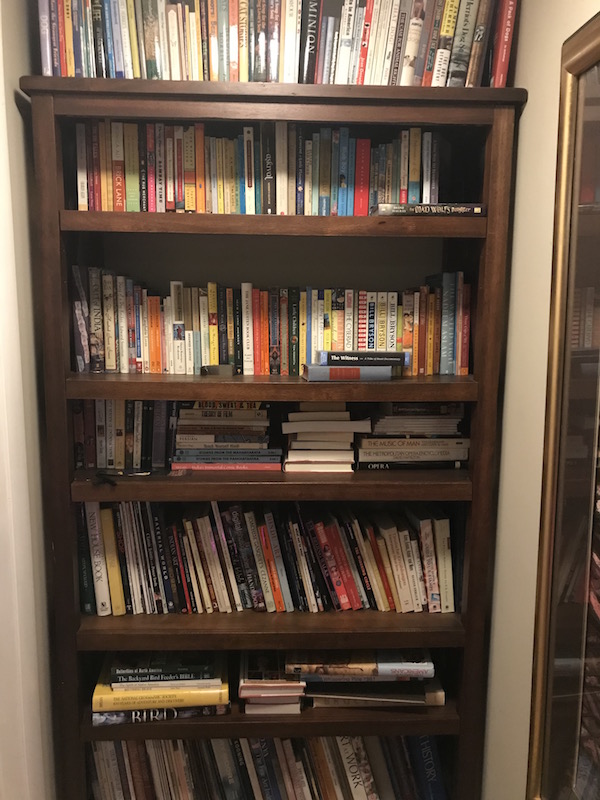
From the photos you showed me, you do, indeed, have a wide variety of books, both on bookshelves and in boxes, and they are almost all perfectly categorized into genres. (Though I do wonder how Hemingway and Thomas Hardy got blended with Geological Hazards.)
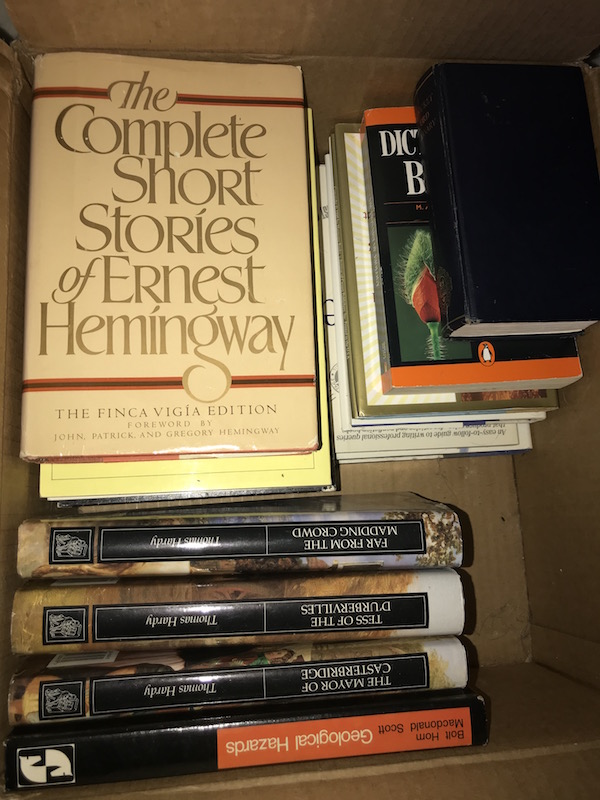
From Harry Potter to Mario Puzo, from 660 Curries to Puppies for Dummies, from C.S. Lewis to a Hindi-English/English-Hindi dictionary, you could open up your own bookstore or lending library. (Though I’d be glad to take that Short Walks in English Towns off your hands.)
DONATE YOUR BOOK TO CHARITIES
We’ll begin with a bevy of traditional charities that accept donations of books. As you’ll see further along, this is not the only option, but it’s where most people start. You probably already have some favorite charities, like Goodwill or Vietnam Veterans of America, but if you’d like to look further afield, consider the following.
Donate Books to Members of the Military — Did you know that the surge in popularity of paperback books actually began in World War II, with the creation of publishing arms dedicated to printing smaller, lighter books? (It helps that the proliferation of book-burning by the enemy helped make the reading of books an almost patriotic activity!) If you’d like to read more about this era, Molly Guptill Manning’s When Books Went to War: The Stories That Helped Us Win World War II offers great insight.
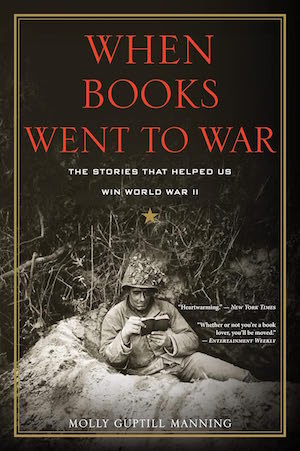
Yes, I digress, but it’s my column and I can meander if I want to! The point is that donating books to our soldiers, sailors, airmen, Marines, Coast Guardsmen, and Guardians is a worthwhile endeavor. Consider these options:
Books for Soldiers – With the motto “Care Packages for the Mind,” Books for Soldiers lets any deployed member of the military request a book (or DVD, or video game). Donors can view book requests, and you send books directly to the troops rather than to a central repository.
Operation Paperback – Through a network of volunteer shippers (that is, donors) around the country, this non-profit lets you input the genres you have and OP’s system will generate a customized address list to which to send books. Operation Paperback also provides books to wounded warrior programs and veterans hospitals in the U.S., as well as USO centers at US Airport transit points.
Donate Books to Prisoners – Education is a key to rehabilitation, which is essential for inhibiting recidivism. In recent years, many prisons have curtailed the ability of prisoners to accept books. During COVID, many prisons are in lockdown, leaving few opportunities for human interaction. Most prisons do not not allow friends or family members to send books directly to prisoners, so only bookstores, online stores, publishers, and donation programs can get books into the hands of prisoners. Each organization has a list of requested genres and items they cannot accept. Please read them carefully, and note that in all cases, dictionaries are highly desirable.
Prison Book Program – In addition to general reading for entertainment, escape (no pun intended) and self-education, they have special programs for disseminating GED study guides, legal books, and dictionaries. Prisoners write essays and reviews of the books they’ve read. Due to COVID, they are not currently taking donations by mail and limiting in-person donations. Please keep an eye on their donation information page as we (hopefully) exit the pandemic.
DC Books to Prisons – This organization accepts English- and Spanish-language paperbacks. Due to COVID, they aren’t currently accepting donations at their usual location, but their volunteers are meeting donors by appointment. The link I’ve provided indicates the genres and titles (both fiction and non-fiction) most desired.
Books Through Bars – This group sends books to prisoners via their offices in New York City, Philadelphia, and Boston.
SATURDAY AND SUNDAY—> Mass-Market paperback drive!
We are in need of the following mass-market paperback fiction*:
* Mystery/Detective (e.g. Sue Grafton, Barbara Neely, Lee Child)
* Thrillers/Action (e.g. P.D. James, James Patterson, Patricia
Cornwell, Clive Cussler) pic.twitter.com/xBWpUasUi5— NYC Books Through Bars (@BtBsNYC) January 16, 2021
Books to Prisoners – This Seattle-based nonprofit mails free books to incarcerated person across the U.S. Operations are currently closed due to COVID, but please keep this option bookmarked for future consideration.
Inside Books Project – This group sends more than 35,000 books to incarcerated Texans each year.
Women’s Book Project – Mail books or donate locally in Minneapolis.
Donate Books to the Wider World – Both at home and abroad, books are heartily desired to build collections in libraries and schools and to be sold so profits can support literacy programs. (The following primarily seek adult books; a future post will cover donations of children’s titles, as the requirements tend to be complex and geographically-specific.)
Better World Books – Simply box up your books, print a shipping label (the cost of which is covered by BWB) and ship to their facilities in Indiana. The books will either be resold to raise money for literacy charities or donated to a child in need, as appropriate. They also have drop boxes in a variety of cities; just enter your community in the search map. (You can also buy used books from their site to help them raise money for their literacy causes.)
Books for Africa – This group seeks paperbacks and hardcovers published in the past 15 years, textbooks, and reference books (including medical and IT/computer books) from the last ten years. Over the past 23 years, they’ve shipped millions of books to children and adults in 46 countries. Donation dropoffs are available in Atlanta, GA and St. Paul, MN. See their requirements.
Open World Books – This Chicago-based 501(c)3 nonprofit accepts donations at their headquarters and at donation drop-boxes around the city, allowing for 24/7 contactless donation. They operate a used bookstore, the proceeds for which fund literacy programs for children and young adults.
Books 4 Cause – Book donations to the Chicago-based Books 4 Cause have helped create 118 libraries in Africa, recirculated hundreds of thousands of books, and saved even more from landfills. Their campus book drives have collected textbooks for developing libraries and supported educational programs in Africa. In addition, donated books for children and adults have been distributed to people in need in Chicago and worldwide. Donations are accepted in Chicago and New York City.
And remember, if you don’t want to even leave your house, Give Back Box is an easy option for getting books donated and on their way with minimal effort and at no cost to you.
DONATE IN YOUR COMMUNITY
While the above non-profits are meaningful, many donors prefer to give their books new lives in the communities where they live. The following donation solutions will differ from community to community and venue to venue. Take an extra few minutes to check out the venues and make calls to each to see what the genre requirements and preferences are, and what, if any, special donation rules exist during COVID.
Retirement homes – If you’ve ever visited a friend or relative in a retirement community or assisted living center, you may have noticed how anemic the “library,” if there is one, seems. A mere smattering of bound Reader’s Digest Condensed Books is heartbreaking to an eager reader. While large print books may be the most appealing for some, lifelong readers love to read and will welcome a wide variety of genres.
Think “old folks” just want classics or naval war histories? Get real. Remember, folks born 90 years ago were just in their 30s in the swinging 60s. My 96-year-old friend watches Grey’s Anatomy and keeps up with the same shows I do. Age is no barrier to reading tastes. If you like a book, someone twice (or even thrice) your age may like it, too!
Age is no barrier to reading tastes. If you like a book, someone twice (or even thrice) your age may like it, too! Share on XHospitals, especially children’s hospitals and veterans’ hospitals – During COVID, patients can’t have their loved ones with them. Many hospitals have terrible Wi-Fi and books offer a rare comfort. And even in “normal” times (remember those?), patients and parents of children often seek something to occupy their minds and time. Call the volunteer director of your local hospital(s) and ask if they have a patient/family lending library and if they are accepting donations.
Ronald McDonald Houses – Across the country, Ronald McDonald Houses offer home-away-from-home respites to families of sick children so they can live close to the hospital during treatment. Not all RM Houses accept used books, though, so call your local RMHC chapter or program house and ask whether they have a library to which you can donate. If you’ve got a TON of books, as @NomdeB has, you might be able to help them create an entire library from scratch!
Homeless shelters – Unhoused people lose so much of the dignity of their former lives; a home is not merely a place in which to live, but it’s a space in which to seek refuge. Books are a place in which to seek mental and emotional refuge. While space is likely to be limited at homeless shelters, it’s worth calling to ask if they have a library area in the building and if they are able and willing to accept donations. (If it’s within your power, you might also want to donate bookshelves.)
Domestic violence shelters – The strength it takes to escape a violent household and build a new life for yourself (and possibly your children) is immense. Emotional reserves of strength can be fortified by education, entertainment, and motivation – all attributes to be found in books. As above, call to see if donations are accepted.
Local professional, community, and high school theaters – When you go to the theater, you probably pay the most attention to the actors, but good sets create an ambiance. Check with your local theaters to see if they would like donations of books, particularly hardcovers to line the shelves of sets for spaces like attorney’s offices or fancy-pants rich people’s home libraries.
Libraries – Although libraries have limited budgets, many public library systems have rules regarding what they can accept for circulation. However, if your community has a Friends of the Library organization, it’s likely that there’s some sort of annual library book sale to which your books can be donated.
Additionally, the American Library Association helps American and international libraries after natural disasters. In general, financial aid is sought, but there are often needs for books, particularly children’s books, when library collections are destroyed. Your library may post requests on your branch web site, so it’s great to get in the habit of visiting your public library’s site to keep abreast of such needs. Also, check out the ever-changing tabs at the ALA’s Book Donation Programs site.
School libraries and academic departments – While public libraries may not be allowed to expand their collections with donations, many public schools, particularly in disadvantaged communities, might find your books a boon. If the middle or high school has a home economics department (do schools still teach Home Ec?), those cookbooks of yours could be a delight!
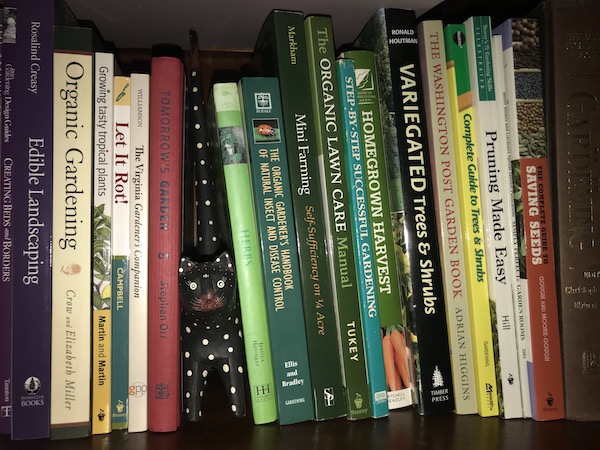
Homeowners Association Clubhouses and Community Centers – @nomdeB, all those gardening books would be a boon to people in a starter home who have never had their own garden. A quick call to an HOA or community center (sometimes found in houses of worship in smaller communities) could find a great home for your how-to and DIY books!
BUILD YOUR OWN LENDING LIBRARY
One of the greatest book-related charms over the past decade has been the growth of the Little Free Library movement. Their website provides all the information you need to start your own lending library program from right outside your own home. Build your library, register it, and trust that the right people will find their perfect reads.
@nomdeB, thank you for asking the first Ask Paper Doll question, and I hope this helps you find homes for your gorgeous collection of books.
Readers, if you have a favorite option for donating books, I encourage you to share in the comments. And, as always, feel free to reach out through social media or my site’s Contact page to contribute your own Ask Paper Doll question.
Introducing “Ask Paper Doll” — Organizing Advice for the Third Millennium
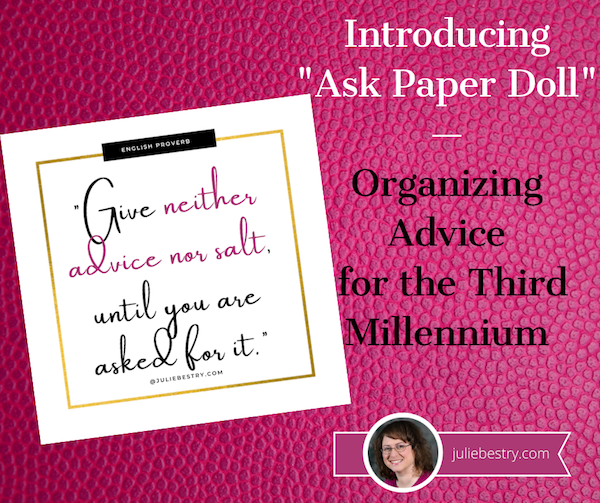
In Shakespeare’s Hamlet, Polonius freely gave his son Laertes some advice, most notably, “This above all: To thine own self be true.” (Fans of both Shakespeare and Paper Doll will note that I don’t always follow Polonius’ second-best-known advice, “Brevity is the soul of wit.”)
Known as “agony aunts” in the UK in the late 1800s and early 1900s, we know them as advice columnists. Twin sisters Abigail Van Buren and Ann Landers (Pauline Phillips and Esther Lederer), doled out relationship and other guidance, often in “zinger” format, in competing newspapers over more than half a century. Examples of the lighter variety:
Dear Abby: I know boys will be boys, but my ‘boy’ is seventy-three and he’s still chasing women. Any suggestions? —Annie
Dear Annie: Don’t worry. My dog has been chasing cars for years, but if he ever caught one, he wouldn’t know what to do with it.
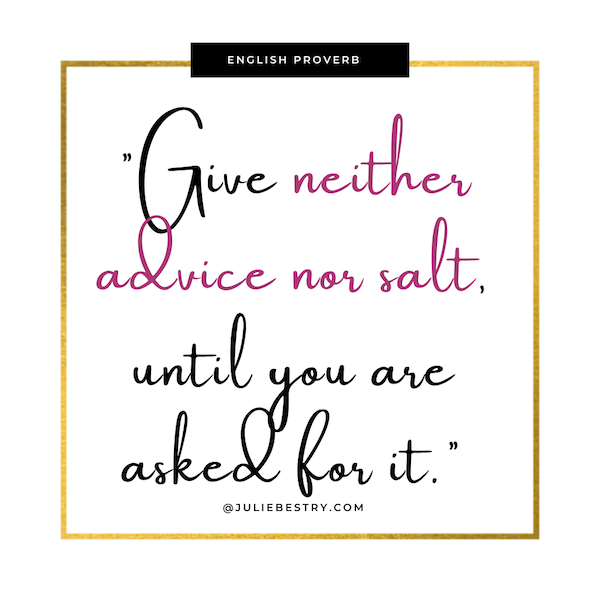
As a recent arrival in the United States in the early days of the 20th-century, my Poppy (Paper Mommy‘s father) used to read a Yiddish column in the Jewish Daily Forward called A Bintel Brief (“a bundle of letters”) answering questions from new immigrants. (A Bintel Brief continues to this day, but online, and in English, and is written by two women named Abby!)
And busy-bee First Lady Eleanor Roosevelt wrote If You Ask Me for Ladies Home Journal and McCall’s.
When I was in elementary school, I read the comics pages and Dear Abby every morning, rarely fully understanding the problems, let alone the advice, but (pre-Google) there was huge appeal in the idea that there was someone out there who could answer burning questions. As a teen, I read the horrifying advice in Ladies Home Journal‘s long-running Can This Marriage Be Saved? (I often suspected it could, but ought not.) Nowadays, there are all manner of advice-givers on a variety of topics, including Dear Amy, Dear Prudence, Dear Sugar, Miss Manners, and others.
I don’t just like reading advice, I like giving it. To steal from radio therapist (and famed chef of tossed salads and scrambled eggs),
Hey baby I hear the blues a-callin’ pic.twitter.com/yKSDR1TaPM
— Sean Leahy (@thepunningman) February 8, 2018
Frasier Crane, I have never known the luxury of an unexpressed thought. (Editor’s note: As this post was going to press, I learned that while I’d first heard the quote on Frasier, it appears to have originated with United States Senate Minority Leader Everett Dirksen.)
I don't just like reading advice, I like giving it. To steal from radio therapist and chef of tossed salads and scrambled eggs, Frasier Crane, I have never known the luxury of an unexpressed thought. Share on XWhat may contribute to my family’s dismay — “know-it-all” may have been an aspersion cast at some point — this is somewhat to the advantage of my clients. And at my speaking engagements, the Q&A portions of the event have sometimes lasted longer than the presentations themselves, and more than once, I’ve continued holding forth as attendees followed me to my car.
As the Press Room page of this site attests, I am extremely lucky (and grateful) to get some great opportunities to share my advice. In 2020 alone, I got to serve as an “expert” for Real Simple Magazine in four issues (February, May, October, and November) talking about organizing challenges as varied as purses, medicine cabinets, garages, and electronic cables and wires!
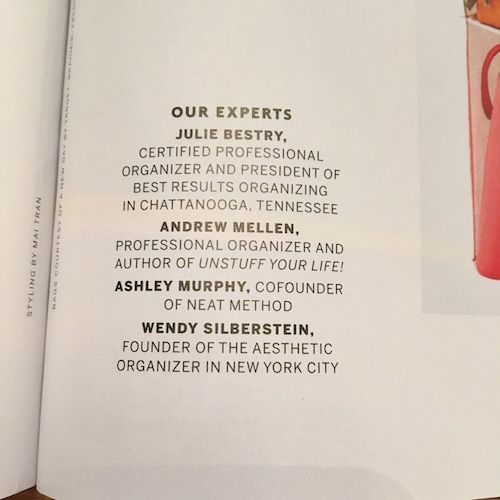

Just last week, the first week of the new year, I got to contribute my insights to roundups for Hire-A-Helper’s “We Asked 12 Professionals How They Made Their Moves Easier,” as well as Geralin Thomas’ “Tools of the Trade for Professional Organizers,” and Ronni Eisenberg’s “The Best of the Best Advice On How To Get Organized In 2021 — Part 2.” And my past advice on organizing for the new year has been updated at Dumpsters.com’s Take the 30 Day Decluttering Challenge.
You just can’t shut me up!
In part, my love of sharing advice about organizing and productivity is what encouraged me to start the Paper Doll blog in 2007. Over the years, I’ve had the opportunity to participate in Janet Barclay‘s Productivity and Organizing Blog Carnivals, and having contributed 50 posts to the carnivals, I have now achieved Megastar Blogger status, shared with five other organizing blogger colleagues: Ellen Delap, Audrey Cupo, Linda Samuels, Hazel Thornton, and Sabrina Quairoli.
As I start my 20th year as a professional organizer and productivity consultant, I want to add something different to the conversation. A brand-spanking-new, recurring feature of this blog will be Ask Paper Doll, an opportunity for you to ask your questions about organizing. I hope you’ll consider me the Dear Abby of the organizing and productivity set for this third decade of the third millennium.
When the Paper Doll blog first launched, not on my own platform, but on Ramona Creel‘s late, lamented OnlineOrganizing.com, under the title Paper Doll, Tackling the Stacks and Piles, the description read:
 Periodic Ask Paper Doll posts will cover the same sorts of things, including (but not limited to) organizing paper, information, and our behavioral approaches toward being more productive and organized. First up will be a request from a friend of several decades, the result of a Twitter conversation.
Periodic Ask Paper Doll posts will cover the same sorts of things, including (but not limited to) organizing paper, information, and our behavioral approaches toward being more productive and organized. First up will be a request from a friend of several decades, the result of a Twitter conversation.
My alma mater had its annual Cornell Cares Day this weekend, a day of service for students and alumni, and along with sharing the link, I included one of the ways to get involved that was most up my alley: “Clean out closets and donate clothes, toys, and books.” In reply, my friend wrote:
 My love for giving advice kicked in, and I promised I’d write a blog post “just for her” on the subject of donating books. That will be the first Ask Paper Doll post.
My love for giving advice kicked in, and I promised I’d write a blog post “just for her” on the subject of donating books. That will be the first Ask Paper Doll post.
Here’s where you come in. What would Abby and Ann have done without their readers? (OK, they’d probably have just made questions up, but we’re not going to do this.) Already, in testing the idea out, questions have included:
- “My get-up-and-go has got up and went! How do I stick with my goals and resolutions?”
- “How do I convince my spouse to be more organized?” (I promise this won’t become a modern-day “Can This Marriage Be Saved?”)
- “What if none of my stuff gives me JOY? Does that mean I can toss my tax returns?”
- …and a ton of questions on organizing health insurance paperwork!
If you have any burning questions you’d like to submit to future Ask Paper Doll columns, feel free to use the Contact page here at Best Results Organizing (putting “ASK PAPER DOLL” in the subject line), or message me on any of the social media links on this page. If you don’t want your identity included, just provide a nom de plume, like Cluttered in Cleveland, and we’ll go from there.
P.S. To be clear, I am my mother’s daughter. In my family, we refer to asking advice of Paper Mommy as “opening the Mommy Encyclopedia,” and the May 2020 (Mother’s Day) issue of Real Simple included my answer about the best advice my mom gave me:
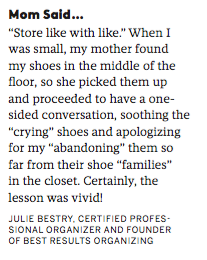
At least you know that I come by it honestly.
6 Steps to Ease Your Way Into Organizing the New Year
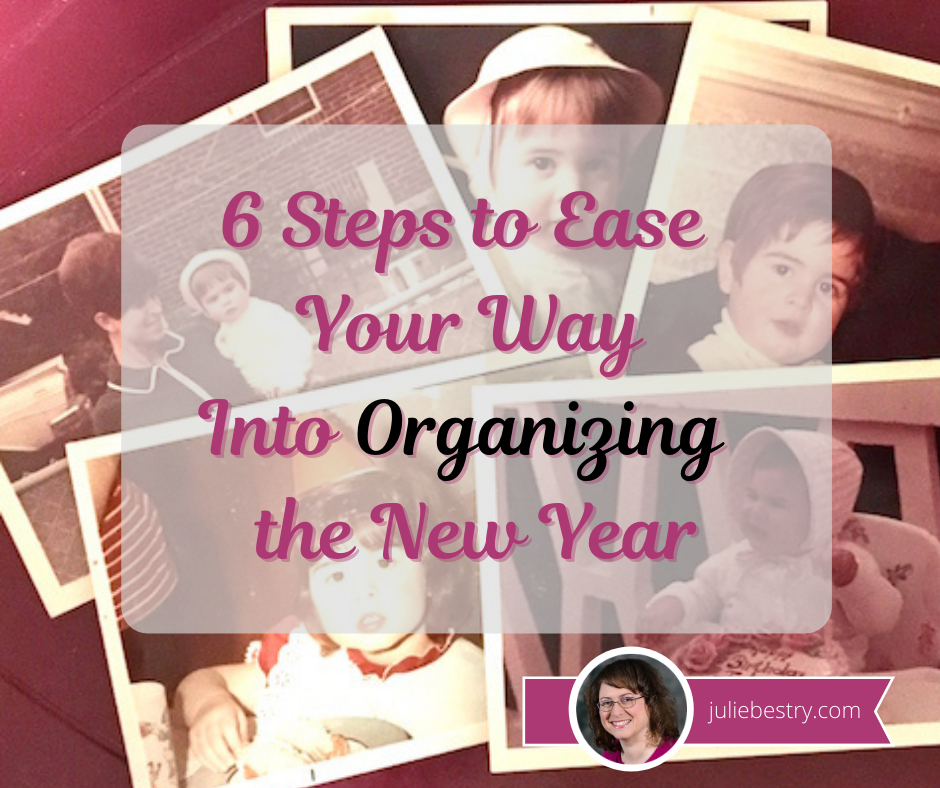
Happy New Year! Paper Doll knows that the first week of any new year (let alone after the year we’ve just escaped), can be daunting. Instead of weighing you down with homework, how about we set you up for success with some simple strategies that will ease you into a more organized approach to this year? Deal?
START WITH BABY STEPS
When it comes to clutter, it’s not the space it takes up in your house, it’s the dent it puts in your life!
When it comes to clutter, it's not the space it takes up in your house, it's the dent it puts in your life! Share on XIf you’re late every day because you can’t find your keys or your kids can’t find their homework, that’s a much bigger deal than a cluttered guest room closet or piles of old birthday party photos that haven’t been scrapbooked. (Need I explain to younger readers that photos used to be on paper?)
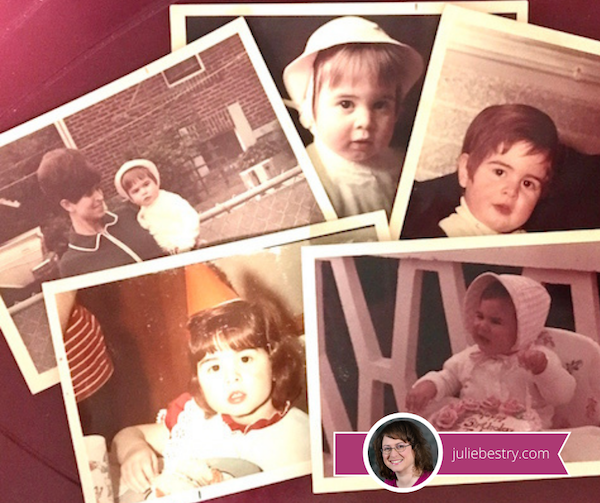
Focus on your biggest daily stressors, break them down into small, actionable steps, and solve those first.
For example, each night after dinner, sort through and declutter one kitchen drawer. When you change for bed, flip through five hangers to see what’s ready to depart. Put a table near the door for the daily launch pad of essential items you need to take with you. Hang a key hook and charging station there and make it a nighttime ritual with your kids to check that everything you’ll need the next day is there.
Don’t even know where to start? Try some of these easy options to organize your finances, your health, and your life – no heavy lifting required:
- Make a tax prep folder. Just grab a folder, label it Tax Prep 2020, and as documents start trickling in this month, you’ll at least have some place to stow them. (Don’t know what to watch for? Read last year’s Paper Doll Says the Tax Man Cometh: Organize Your Tax Forms to get a head start.)
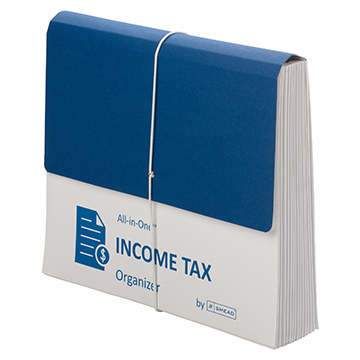
If you want to get a little more advanced, consider Smead’s All-in-One Income Tax Organizer.
- Flip through your new 2021 planner or your digital calendar to see what medical appointments are already scheduled. Make a list of all the doctor’s appointments that you need — family doctor/GP, pediatrician, dentist and orthodontist, ophthalmologist and/or optometrist, OB/GYN, and any specialists, as appropriate.
Check all those appointment cards at the bottom of your bag or thrown in the junk drawer to make sure you’ve scheduled them on your calendar. Then pick up the phone and make all the other appointments now. (Going forward, always schedule your next appointment before you leave their offices. See if you can make one day a week, like Mondays, your “appointment” day so that you’ll get it out of the way early in any week.
- Look through your wallet and VIP files to see what needs to be renewed — driver’s license, car registration, passport, etc. Instead of marking just the expiration date, make notations on your calendar to handle renewals enough in advance so nothing falls through the cracks.
GIVE UP TOLERATING WHAT BRINGS YOU DOWN
Last summer, in Organize Away Frustration: Practice the Only Good Kind of Intolerance, we talked about this at length. Take notice of the things that annoy you, whether it’s a closet too cluttered that you can’t close the door, a light fixture that keeps flickering, or a cable bill that should be renegotiated with a gentle threat to cut the cord. If something doesn’t bring you closer to the life you want to be living, make this the year you let it go. Don’t tolerate what doesn’t delight you.
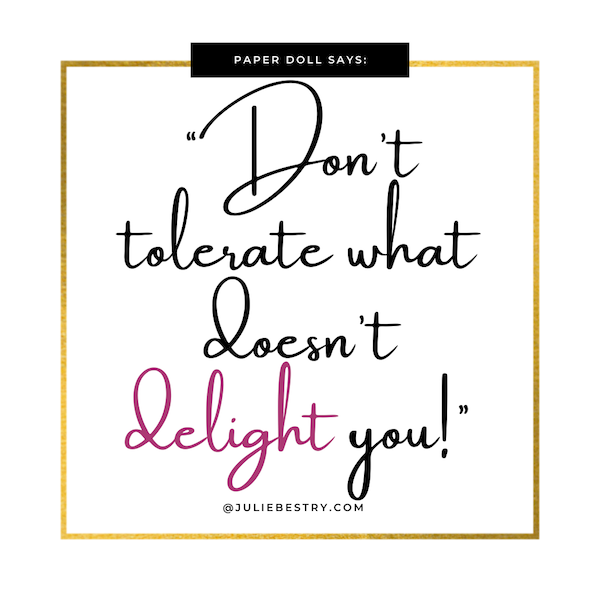
Do a brain dump. Think of a brain dump as mental hygiene, like the cognitive equivalent of brushing your teeth. Ever have the taste of garlic or fish in your mouth after dinner, such that you couldn’t really enjoy your dessert? A brain dump, where you get everything out of your head and onto paper, let’s you stop thinking of things and start thinking about them, in context. Taste your life!
Try to make a list of everything that you know you have to do in order to stop being frustrated. Go room to room and write down what you need to address. (If you’re the kind of person who really needs categories, you can create columns for things that are free or only require your own effort vs. things that require payment.)
Once you have the list, you can start working through what are immediate priorities, what’s worth scheduling, and what can go on the “I’ll do it if I’m so bored it’s between doing this task or watching paint try” list.
Feel free to tackle the tasks in any order you choose, but come up with a plan. Easiest-to-hardest helps you gain confidence; hardest-to-easiest makes everything less stressful because you’ve tackled the most difficult item first. Doing the free tasks first gives you time to budget for the more costly ones, but if you can purchase freedom from a frustration, it’ll release mental energy for other tasks.
STOP USING CLUTTER AS A TO-DO LIST
- Are you keeping a holiday gift on the dining table so you’ll remember to write a thank you note?
- Do you have boxes of donations in the middle of the hall to prompt you deliver them?
- Are you keeping a receipt to remind you to get someone to pay you back for their half of a gift (or to remind yourself to pay them back)?
- Is your unopened electric bill sitting out to remind you to pay it?
- Do you have months’ old email in your inbox hoping that keeping it there will push you to reply?
How’s that working for you? Instead, follow these steps.
- Clear your desk or a space at your kitchen or dining room table to give yourself work space.
- Take five minutes and look around the room you’re in. What do you see that’s out of place because you’re (intentionally or otherwise) using it to prompt you to do something?
- Grab a notebook and for each thing that’s in the wrong place, write down what you should be doing, instead. Yes, this gives you a To Do list that will stare you in the face (but we’ll get to that).
- Put the item away so that it’s no longer clutter.
- DO THE THING!
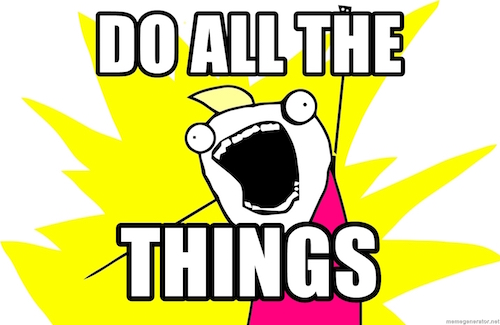
©2010 Allie Brosh, Hyperbole and a Half, via MemeGenerator
Let’s see how this works. Unpack and put away the holiday gift and go grab a notecard, envelope, return address label and stamp. Put it down on your cleared desk space.
Now, here’s the first tricky part. You can either write out the thank you note right now (check out my Gratitude, Mr. Rogers, and How To Organize A Thank You Note for guidance) and then you won’t use all your mental energy procrastinating about it, or you can put it on your To Do list. If you write the note now, you can put it on your To Do list and check it off your list, all at once, giving you an immediate sense of accomplishment! Whoohoo!
Repeat the process. Carry the donation boxes to your car, then eyeball your calendar to figure out when you can deliver the donations. Schedule the task, delegate it to a family member, or use GiveBackBox to schedule a free pickup.
And again! Use your favorite app, like Zelle, CashApp, Paypal (or ugh, fine, Venmo) to pay or request money and either file or shred the receipt as necessary. Pay the electric bill. Reply to the email or declare bankruptcy on it.
FOLLOW THE ICE CREAM RULE
So maybe your clutter is there because you don’t know where else to put it.
I tell my clients, “Don’t put things down, put them away.” By “away,” we assume you’ve already got a location in mind. Good organizing systems have two parts: the where & the how. If you bring home a bag with three items, ice cream, toilet paper, and breakfast cereal, I’m pretty sure you’re going to put the ice cream away in the freezer first (and immediately) to keep from having a melted, sticky mess. The freezer is the “where” but putting the ice cream away first is the “how.” It’s so innate, you don’t even think about.
Clutter comes from deferring that decision making. With ice cream, you don’t even have to stop and think; it’s instinct built from life-long experience. With everything else entering your home (whether a purchase, a gift, or a freebie), decide on a home before you buy or bring it in. Once it’s in your space, build time into your calendar for how/when you’ll deal with maintaining it or getting it back to where it lives.
Do you bristle at the idea of planning when you’ll do things? Maybe you feel like scheduling things belongs in the category of “budgets” and “diets” — it’s about The Man trying to keep you down!
The thing is, if you’re organized, you probably already have a system and your system feels like a safety net rather than a suffocating obligation. If you’re NOT organized, you’ll just have to trust that a system – a plan, if you will – makes life more organized so you don’t have to keep thinking about these things.
What are the triggers in your system? When will you do laundry: when the laundry basket is full or when it’s Tuesday morning after breakfast? When will you file financial papers? When your in-box is overflowing, or when your computer dings to tell you it’s 11:45a on Wednesday?
Remember: “Someday” is not a day on the calendar. Until something is innate, having an auditory or visual trigger (or both) will help remind you where and when to put things away.
REMEMBER THAT EVERYTHING SHOULD HAVE A HOME…BUT NOT EVERYTHING HAS TO LIVE WITH YOU
Systems are important, but don’t forget a universal truth: not everything you own needs to stay in your orbit forever.
Give what is no longer age-, size-, or lifestyle-appropriate new life via charity or consignment. Let it be a blessing to someone else.
Give what is no longer age-, size-, or lifestyle-appropriate new life via charity or consignment. Let it be a blessing to someone else. Share on XIf it’s broken and you’re not willing to spend the time or money to repair it, let it go. If you have an emotional attachment to something that’s broken, outdated, or takes up too much space to keep, take a photo of you holding it or wearing it. Then set it free!
Setting up a donation station in your home is as easy as putting a box or plastic tub in your utility room, mudroom, or garage. When you’re doing laundry or sorting through toys in the playroom, if it doesn’t fit your life, take it to the donation box right away. When the box is full, log the contents (if you’ll be taking a deduction), and send it to your favorite non-profit. Don’t wait until you have lots of boxes – one box of useful items or clothes, sent on its way, is more useful to others than mountains of boxes that never make it out of your home.
Are your file folders bulging? Do I Have To Keep This Piece of Paper? gives you a clear idea of what you need to keep and for how long. The rest? Shred and send on its way! Buh-bye!
FOLLOW THE BUDDY SYSTEM
Getting your space, time, and priorities in order can be overwhelming, but you don’t have to go it alone. For accountability and support in reaching your organizing goals, buddy up with:
- Your spouse – Trade the chore you hate (unloading the dishwasher) for the one that annoys your spouse (folding laundry) and you’re each less likely to procrastinate.
- Your kids – Make organizing a game – play Beat the Clock with your kids to see who can collect the most things that don’t belong in the living room before the song ends, and then work together to put the items away.
- Friends – Make organizing social, even when you can’t get together. Text “fashion show” photos or do a Zoom call as you organize your closets. (Friend-of-the-blog Nancy Haworth of OnTask Organizing and I did this last week! I got rid of big-shoulder-pad 80s-style blazers and she jettisoned clothes that pre-dated her strong, lithe, “certified exercise instructor” shoulders!)
- A professional organizer – As a Certified Professional Organizer®, I know how much my clients get out of having someone who knows the ropes guide them in making solid decisions and developing systems to surmount those challenging obstacles. Find a professional organizer near you by using the search function for the National Association of Productivity and Organizing Professionals (NAPO).
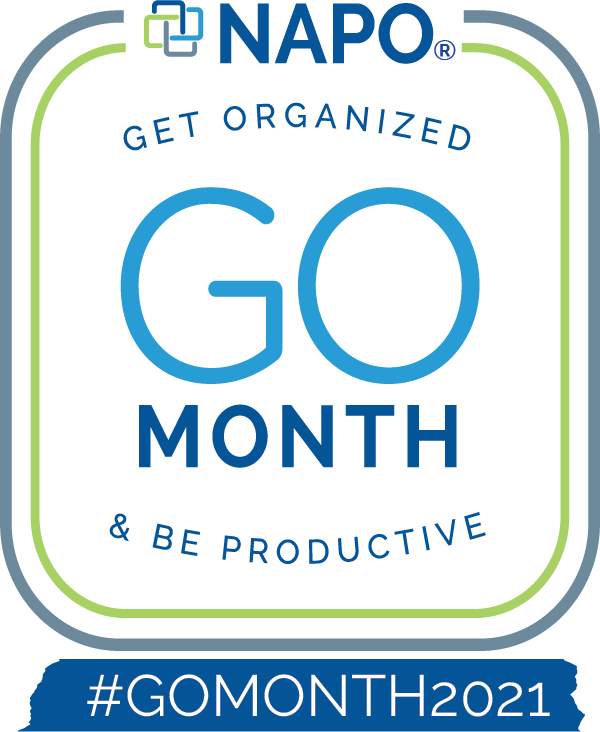
Speaking of which, it’s January, so that means it’s GO (Get Organized and Be Productive) Month! It’s the perfect time to focus on making your life run the way you want it to. Happy New Year, Happy GO Month, and just plain…be happy!
Paper Doll Wraps Up, Declutters, and Updates 2020

It’s been quite the year. “Unprecedented,” you might say. (Or, better yet, let’s not say. How about we purge that word from our vocabulary?) Before we turn the calendar page to 2021, there are a few additions and updates for the posts you read (or might have missed) over the past year.
PANDEMIC PRODUCTIVITY
The Now Normal: When the New Normal Changes Quickly
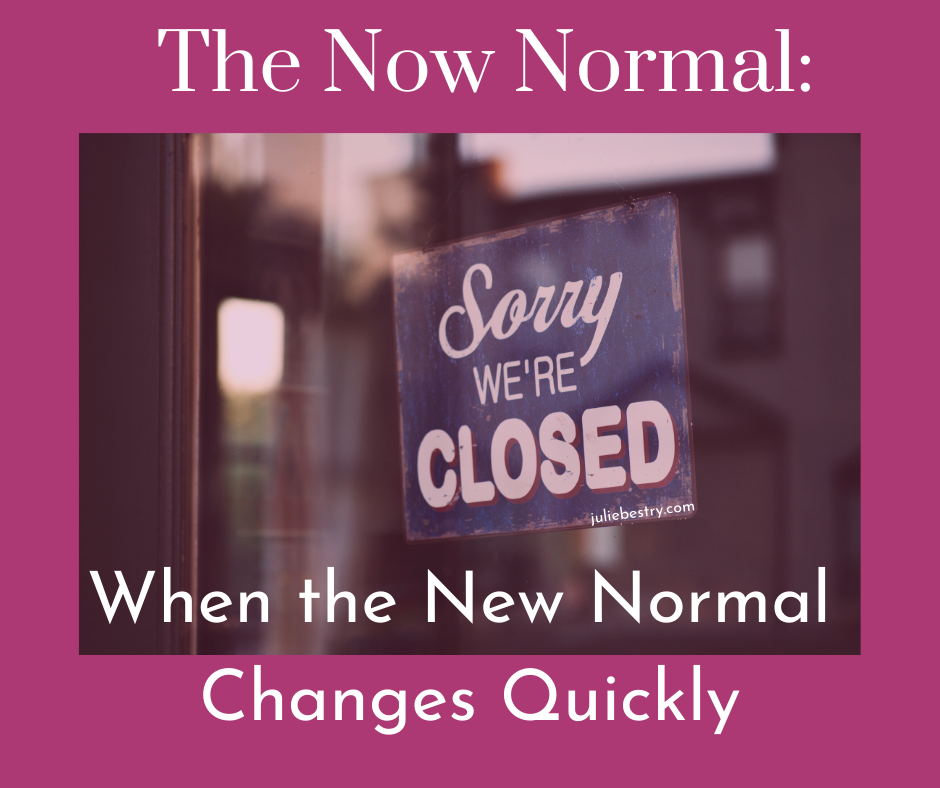
Back in March, none of us knew what the next nine months would bring. I’d acknowledged the difficulty of being at home, whether that meant working from home, home-schooling, or dealing with family and their foibles 24/7, and noted that at least, to some extent, we’d get used to it, or at least we’d have to get used to the “Now Normal” of things constantly changing and us not getting used to things. Little did we know how long (how very, very long) we’d be getting used to things constantly changing. I gave you all permission (as much as anyone needs permission from random internet bloggers) to be OK with not being OK.
Now, on the cusp of 2021, there’s light (in the form of a vaccine) at the end of this tunnel. But I suspect things will never go back to exactly where they were. Remote work had already been increasing (by 173% between 2005 and 2018); 2020 gave companies the impetus to make this a more permanent option. Companies that had believed workers could never be as productive when working remotely found that the opposite was true. According to research collated by Apollo Technical:
- Performance can improve up to 13% when working remotely (in a quieter, more convenient workspaces)
- Remote work yielded greater worker satisfaction
- Remote workers spend 15% less time avoiding work tasks
- Anecdotally, once supervisors trust the work-from-home approach and stop micromanaging, productivity increases.
This doesn’t mean we can extrapolate only good things to come out of more people working from home. Even once children and life partners are no longer in the home/work space, the distractions of household tasks (especially for women) will likely adversely impact productivity, and research indicates that productivity may take a hit due to prolonged lack of social interaction (especially for extroverts, like moi).
Some workplaces will stay 100% remote; others will return to traditional venues; and I suspect many employees will demand greater flexibility, and companies will want to consider the reduced overhead associated with smaller (or no) dedicated offices. The only thing we know for sure is that things will continue to change, and we’ll have to be nimble, accepting that the sand will keep shifting under our feet. As L.P. Hartley once wrote, “The past is a foreign country; they do things differently there.”
The only thing we know for sure is that things will continue to change...As L.P. Hartley wrote, 'The past is a foreign country; they do things differently there.' Share on XPaper Doll’s Ultimate Guide to Organizing a Virtual Field Trip
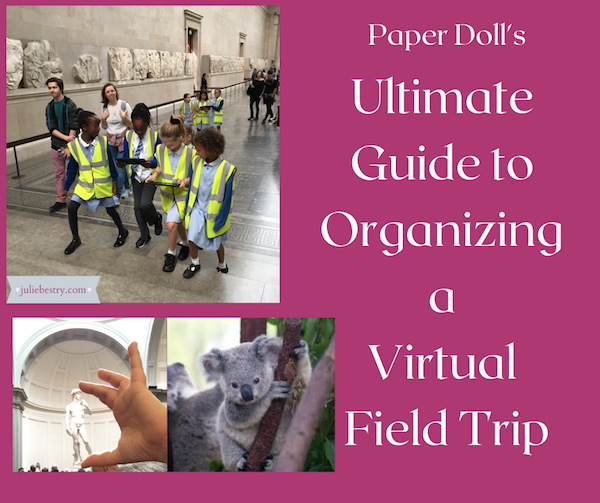
This post proved to be one of the most popular during the early pandemic. Organizing our days to include breaks, including virtual day trips to escape monotony, became a necessity this year, and rarely a week went by when a reader did not email or tweet or post to tell me about other cool virtual field trips.
Friend of the blog Janet Barclay knows that Paper Doll is a consummate Jane Austen fan, and forwarded Celebrate Jane Austen’s Birthday With a 360-Degree, Interactive Tour of Her House, and from there it was a quick hop, skip, and virtual jump to the Emma Thompson-narrated Twelve Days of Christmas special. There are also paid live virtual tours of Jane Austen’s House from Home, trails, and exhibitions. (Two live tours in January each go for £5, or about $6.78).
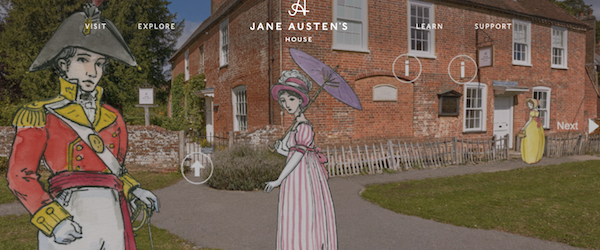
Discovery Education has developed a variety of live and on-demand, family-friendly interactive field trips. Each is free and includes a companion guide with hands-on learning activities! Take your kids to “visit” the Johnson Space Museum in Houston, see the cars of the future, hobnob with polar bears in the Tundra, and so much more. Whether you need a virtual field trip to break up winter vacation, quell home-schooling doldrums, or reverse just too little play time, Discover Education is a delightful addition to the options in my post.
Perhaps you binged too much of The Crown and need a reality check? Take a virtual tour of Buckingham Palace. Prefer a different venue? How about the Taj Mahal, the White House, or the Vatican?
Virtual Museums started an interactive map of the world’s museums available to virtual visitors. (Create an account to track and rate your visits.) From the Canadian Museum of Human Rights to South Korea’s National Museum of Modern and Contemporary Art to the mysterious fossils of the Graz Natural History Museum in Austria, new field trips for grownups are appearing all the time.
And if you need the the kind of field trip that takes you away from the hubbub, Escapista may be to your liking. Escapista has developed a manifesto to explain its approach to selecting opportunities for immersive meditative experiences, from pausing by a snowy river to Norway’s “Slow TV” experience of ten hours on a train. (Click the speaker icon to turn on the audio.)
Be sure to organize time in your life to relax and to learn for fun.
Does Anybody Really Know What Time It Is? 5 Strategies to Cope With Pandemic Time Dilation

There’s an irony of mentioning time dilation between two long weekends marked by Christmas and the new year. I’ve lost count of how many people have told me they checked for the mail on Friday or took the trash to the curb on the wrong day.
In the original post, I explained why our body clocks became so borked during our quarantine and recommended five strategies, with LOTS of tactical suggestions, for keeping everyone from becoming unstuck in time:
- Put structure in your life.
- Enhance novelty.
- Create vivid sensory clues for the passing of time!
- Get what you know you need! (Daylight, sleep, exercise, and for those of you who’ve had the same pair of sweats in rotation since St. Patrick’s Day, get dressed!)
- Take a technology break.
As a professional organizer and productivity coach, my job is to help people get more out of their time. But efficiency isn’t everything. In a year like we’ve had, and going forward, some daydreaming and navel-gazing preserves sanity. If you find yourself losing track of time too often, add in a bit of structure to your day and use technology to get a quick “beep-boop.” But do give yourself permission to enjoy the one small benefit of this year, living by your natural body clock.
Organize Your Health: Parental Wisdom, Innovation, and the New Time Timer® Wash

Don’t touch your face. Wear a mask. Wash your hands. It’s good advice, so listen to your mom. Listen to mine.
READING RENEWAL
12 Ways to Organize Your Life to Read More — Part 1 (When, Where, What, With Whom)

I’m not the only embracing tips for reading more. Oprah, the ultimate book club leader, may have ended her print magazine, but the December issue offered up 20 Simple Ways to Read More and Enjoy More Books in 2021. (Personally, though, I preferred my take on developing a reading nook. What do you think, readers?)
12 Ways to Organize Your Life to Read More — Part 2 (Reading Lists, Challenges & Ice Cream Samples)

Want to read more in 2021? You’ve got a bounty of options for finding recommended reading lists. One of my favorites is the NPR Book Concierge. (Find annual suggestions going back to 2013.)
If, instead of looking for a specific title, you want to find a 2021 reading challenge that, well, challenges you, opportunities abound, including:
The Uncorked Librarian (Most intriguing suggestion: read a book set on a train.)
Modern Mrs. Darcy (This year, it’s not just reading prompts, but an entire interactive kit for creating your personalized reading life!)
GirlXOXO Master List of Reading Challenges (While I’ll skip the challenge to read mysteries with cats as main characters, there are certainly lists galore for every taste!)
Meanwhile, who would be up for a Paper Doll reading challenge to embrace books on organizing and productivity?
How To Make Your Reading Time More Productive With Book Summaries
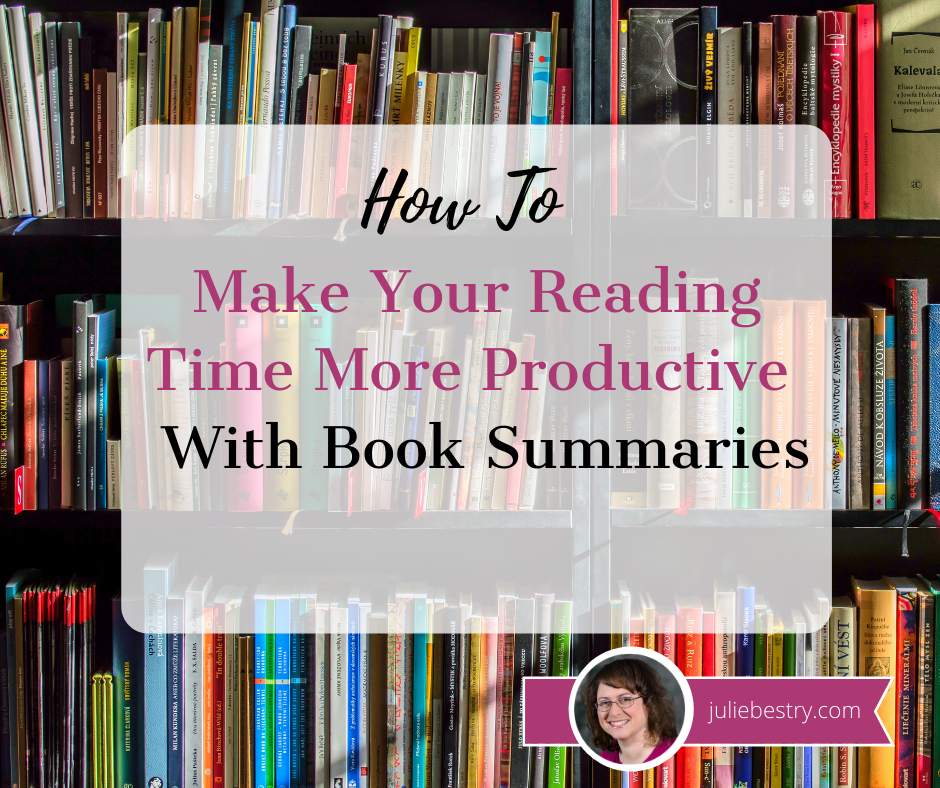
My coverage of book summaries focused on non-fiction. Unless you’re in 11th grade English class (sorry, kids), you probably don’t want summaries of novels. However, you can get ice cream tastes of fiction, to see if you like an author’s style.
- Most people are familiar with Amazon’s “Look Inside” feature, which allows you to click a link above the book cover and read a handful of pages. But did you know that many Kindle books have “Send a free sample” link so you can preview chapters? Check in the browser version, not the app, below the “purchase with one click” section and above the “add to list” button.
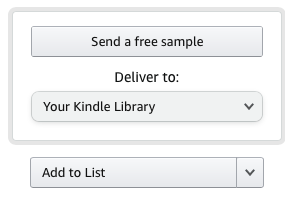
- You can also get a free audio sample. Check for a link under the book cover.

- Literary Hub has daily offerings of novel excerpts. Click on the book cover you want to try, and the resulting page provides short author bio and a selection from the novel. Titles range from new releases, like Mrs. Murakami’s Garden, to reprints of classics, like Betty Smith’s Tomorrow Will Be Better. (Literary Hub also has short stories excerpted from short story collections.)
PAPERWORK DECLUTTERED
Organize for an Accident: Don’t Crash Your Car Insurance Paperwork

In April and May, due to much of the country quarantining and people driving far fewer miles, many insurance companies offered 15%-25% premium rebates to customers.
While rebates largely disappeared by June, that doesn’t mean you should be paying full price if you’re still staying close to home. For example, if your workplace has decided to go “permanently remote,” and you no longer have a commute, it’s worth contacting your insurance agent about potentially lowing your premiums now that you are regularly driving less each week. One option insurance companies are exploring is vehicle telematics, little “black boxes” that keep track of your speed, mileage, and precision at accelerating and decelerating, and report back to the insurance company. Safer drivers get better rates.
Similarly, if your college-age student is not currently on campus and is attending school remotely (from your home), that means your car is in the driveway most of the time, not states or time zones away. Review your situation with your agent for the greatest number of discounts.
Paper Doll On Narwhals, Fake News, and How To Get A REAL ID
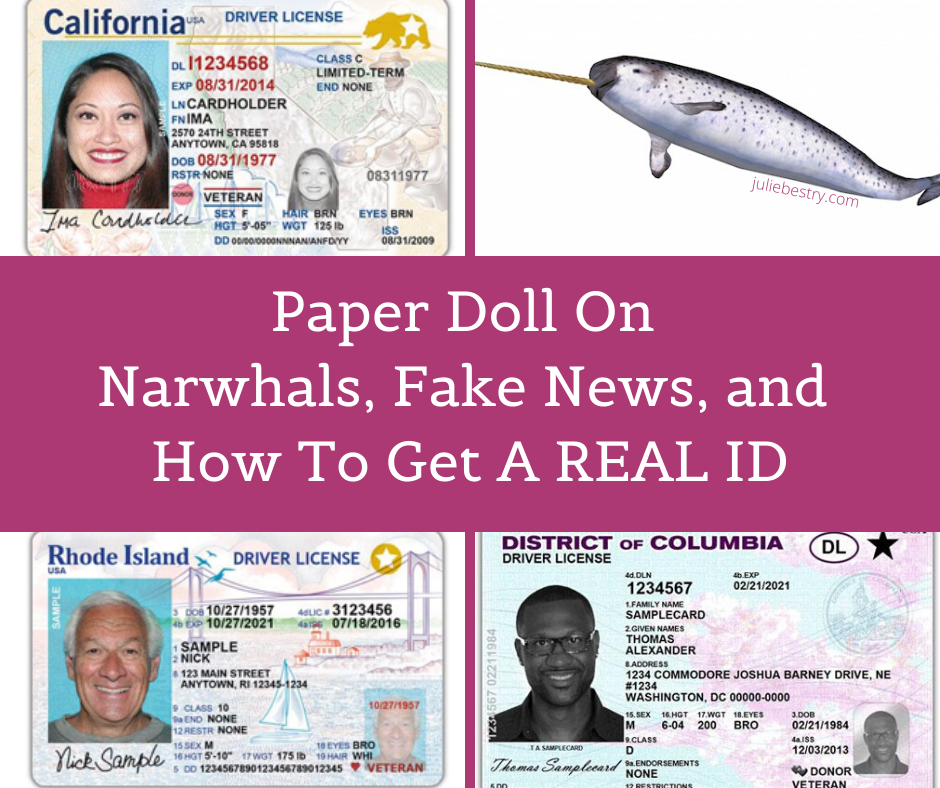
Everything in the post is still accurate except for the enforcement deadline. Due to COVID, the federal government delayed enforcing REAL ID by one year, to October 1, 2021. Remember, as of next October, if you don’t have Real ID-compliant identfication, you won’t be able to board a domestic flight or enter federal courthouses or restricted federal facilities, like military bases, nuclear power plants, or the White House.
Paper Doll Says The Tax Man Cometh: Organize Your Tax Forms
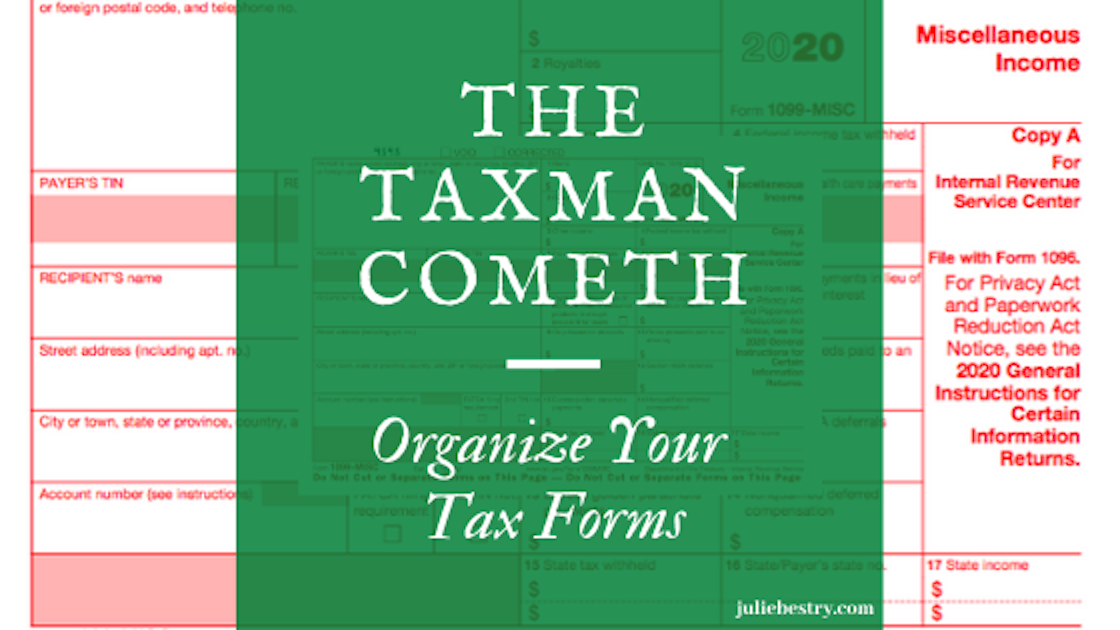
The forms are the same, but a few the rules have changed. Kiplinger’s Magazine covers a few dozen of the Tax Changes and Key Amounts for the 2020 Tax Year.
ORGANIZING ADVICE, PLAIN AND SIMPLE
The Truth About Celebrity Organizers, Magic Wands, and the Reality of Professional Organizing
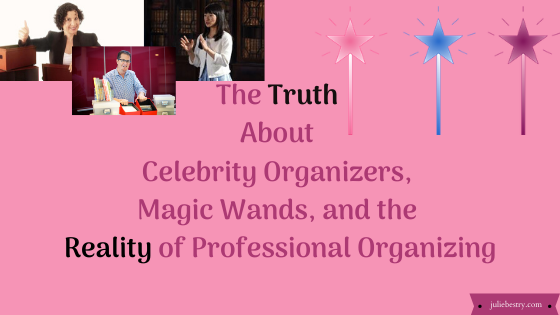
As you head into 2021 armed with resolutions to get more organized, please review my counsel in this post. I stand by my word that there are no magic wands!
And in a future post, I’ll have more to say about advice from celebrity organizers with regard to organizing by color. Here’s a preview:
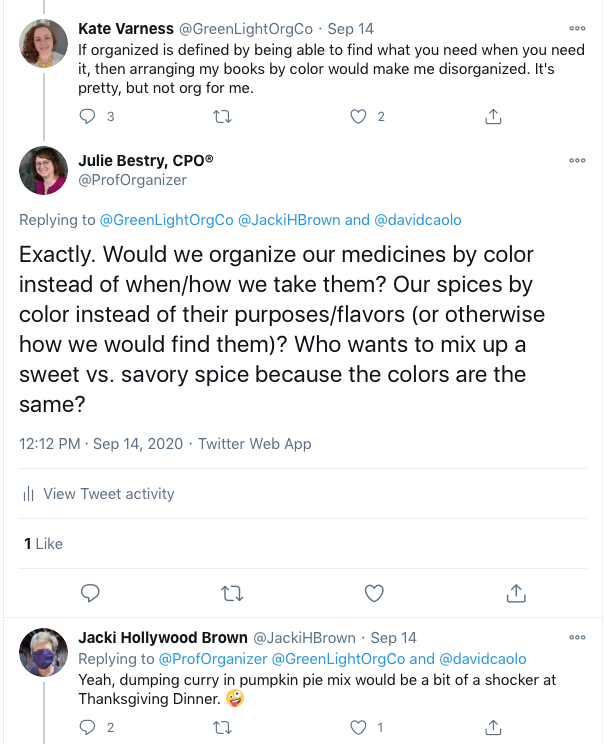
(Readers, if you like curry in your pumpkin pie, feel free to tell Jacki directly!)
Organize Away Frustration: Practice The Only Good Kind of “Intolerance”
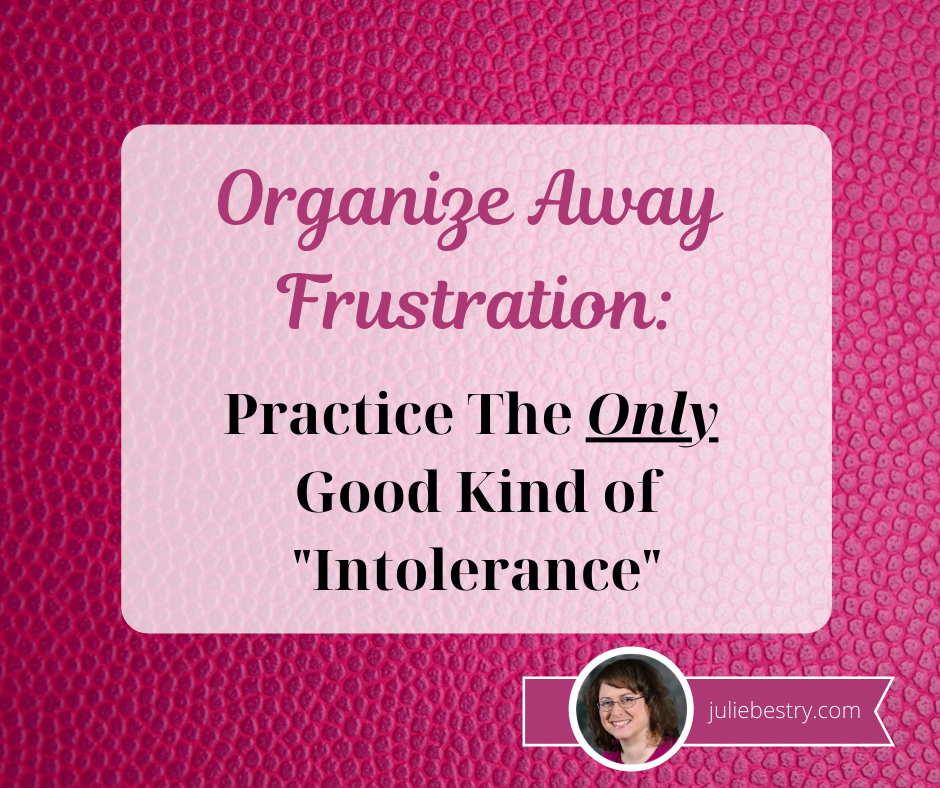
This is the perfect week for you to take note of whatever frustrated you during the holiday season: a light system with too many broken bulbs, an artificial tree that has seen better days, a sense of obligation to send holiday cards to people who haven’t so much as liked one of your Facebook posts in a decade. Stop tolerating what doesn’t work for you, and if you don’t know the solution, seek help to find one.
Paper Doll Peeks Behind the Curtain with Superstar Coach, Author & Speaker Leslie Josel
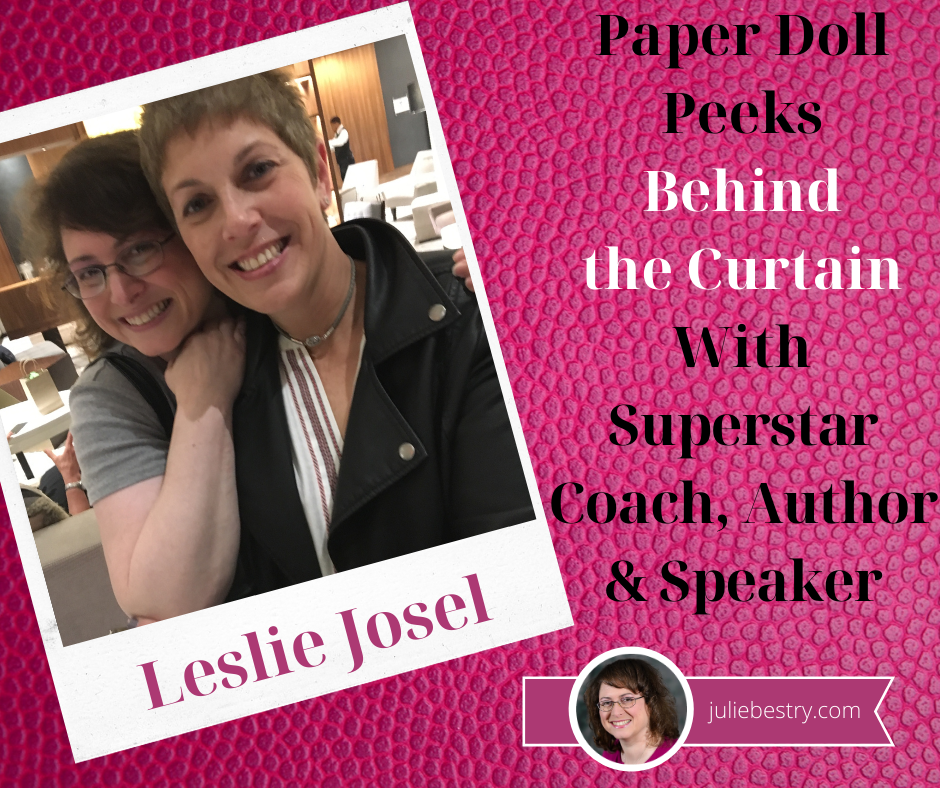
Our talk about 1980s sweaters may have been dated, but discussion of student procrastination is not. This fall was the first semester that was 100% in COVID times; even stellar students struggled, and “taking an incomplete” has become a common refrain. If you have (or are) a student, Leslie’s How To Do It Now, Because It’s Not Going Away should be on your bookshelf.
Organizing in Retrospect: A Confessional Look Back at 2020
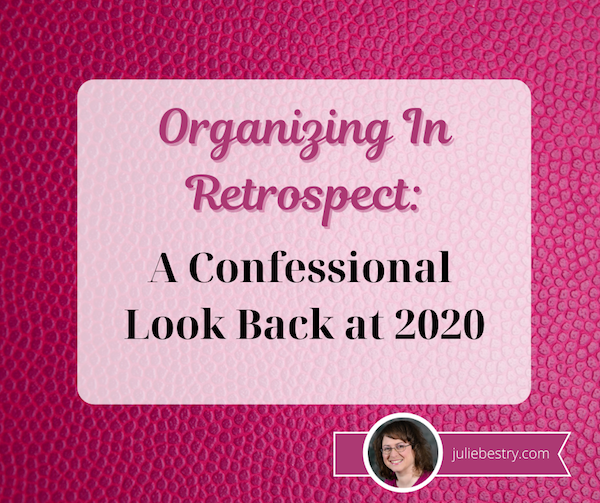
Writing this post, I realized I accomplished more than I realized. (Which would have been easy; when people asked what I’d been doing this year, I was often at a loss for words. “Missing my mom, my friends, and my travel plans, eating too much cheese, and craving Chinese food” seemed like an ineffective response.
This quiet lull before the new year is the perfect time to pull out your calendar and scan your To Do lists. Take notice of your achievements; in a year like this, it’s easy to forget small (and even not-so-small) victories. Ask your friends and loved ones to report back on the successes they recall from your year. Tally them up. Whether you use this in your next performance evaluation at work or just to buck up your self-esteem, remember that surviving this year intact is an accomplishment!
CLUTTER-FREE HOLIDAY GIFTS
In a Downton Abbey-themed post a few years ago, I told you about Give Back Box, a program whereby you could gather up the items your new holiday presents made redundant and easily ship them off to charity. This year, especially, when a touch-free donation option is especially useful, I encourage you to explore Give Back Box.
Clutter-Free Holiday Gifts for the Weird Year of 2020 (Part 1): New Twists on Old Favorites

For those of you looking for gifts of cooking classes, two highly praised options came in after deadline: King Arthur Baking‘s impressive calendar of interactive, online cooking and baking classes, and Milk Street‘s live-streamed and recorded, self-paced virtual classes. (If you give a cooking class gift to someone with whom you live, you get to eat the homework!)
Clutter-Free Holiday Gifts for the Weird Year of 2020 (Part 2): Giving Well, Giving Back

In addition to tangible gifts that give back to others, I wrote about charitable giving in your recipient’s name. Due to COVID, new tax laws let most taxpayers deduct cash donations of up to $300 made by December 31, 2020 when filing taxes in 2021 – even if you don’t itemize. (Note, this is a “per return” deduction, meaning married couples get the same $300 deduction as singletons. Consult your tax advisor.)
Clutter-Free Holiday Gifts for the Weird Year of 2020 (Part 3): Organizing Yourself & Others

Finally, I hope one of the gifts you give yourself is the time and opportunity to keep reading organizing and productivity advice here at Paper Doll.
Thank you, my dear readers, and have a happy, healthy 2021!
Clutter-Free Holiday Gifts for the Weird Year of 2020 (Part 3): Organizing Yourself & Others

What? Another post on clutter-free gifts? Yes!
First, Paper Doll gave you Clutter-Free Holiday Gifts for the Weird Year of 2020 (Part 1): New Twists on Old Favorites so you could give more memorable gifts of experiences. Then, I shared Clutter-Free Holiday Gifts for the Weird Year of 2020 (Part 2): Giving Well, Giving Back, to help you give gifts that give back to those less fortunate while still showing love to your friends and family (and acknowledging that they made it through this wackadoodle year).
Today’s post is different. While you can give these gifts, both tangible items and services, to the people on your list, they are (or can be) primarily for you, to help you make your life more organized.
Maybe Grandma sent you a check? Perhaps you got gift cards to order things online and avoid the stores? It’s possible one advantage of quarantining was that you didn’t have to lay in a supply of small, impersonal gifts to give acquaintances at the office in case they popped by your desk with small, impersonal gifts for you! If you have a little money left over, or if you’re good about budgeting for things that make your life better, then here’s a gift list to make your 2021 more productive and less stressed.
ORGANIZE YOUR PAPER
“Stuff” doesn’t automatically mean clutter. For example, paper shredders help you eliminate unnecessary paper while protecting your identity. How overflowing are your file folders? When was the last time you purged your files?






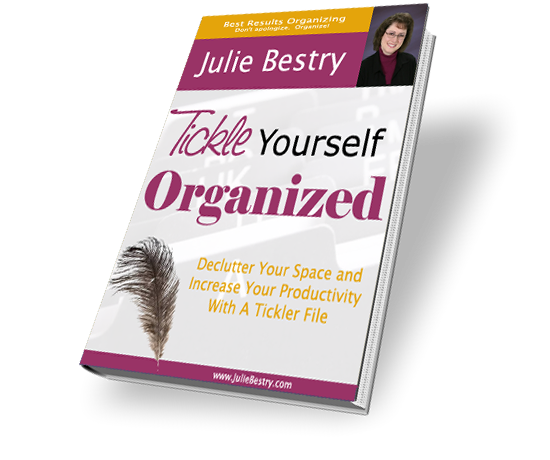


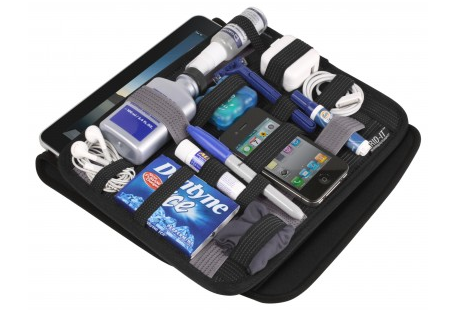



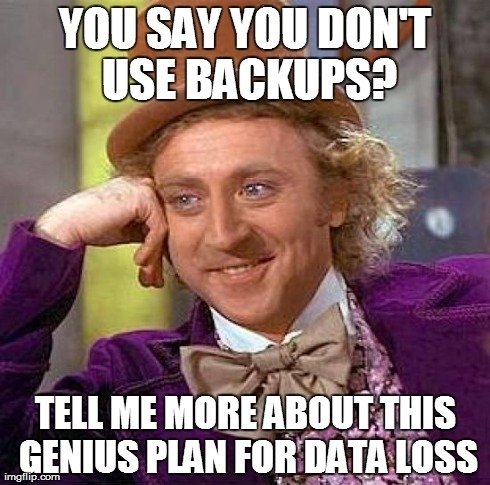




Follow Me